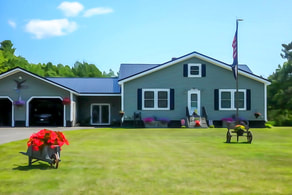we take the hassle out of finding the best assisted living setting for you.
Our goal is to make life easy for our seniors and families in Spokane who are searching for senior care services. We are Spokane locals and frequently visit these communities making sure they meet our standards for quality of care. We understand that finding reliable Senior Living Communities, In-Home Caregivers, or any type of senior services can be time-consuming and stressful. We are here to make the process as easy as possible.
What we do
1. Identify Your Needs
We specialize in providing tailored services for seniors looking for the perfect living situation. We start with a comprehensive assessment to identify needs based on your budget, health, physical location and family connections. Our experienced team takes into account accessibility issues, medical requirements, personal preferences and access to local resources - all of which are essential when it comes to senior living. Moreover, we also ensure there are appropriate social activities available so our clients can remain active and engaged in their communities as they age gracefully.
2. Tour Communities
After we learn about your needs, our experts use their extensive knowledge of the industry to identify a select few options that best meet your personal requirements and preferences. To ensure complete satisfaction, we arrange tours of each selection so you can get a better sense of the environment before making a decision. With one of our knowledgeable specialists by your side, you can trust that we will help you make an informed and comfortable choice.
3. Transition Seamlessly
To ensure the smoothest transition possible, our team will provide support throughout the entire process - from completing paperwork to connecting you with the best moving services available. We are committed to guiding you every step of the way, so that your move is as stress-free as it can possibly be.
4. How We Get Paid
Our commission for successful moves is up to one month’s rent. We partner with a wide selection of communities in and around the Spokane area. so we are not limited to any single community, which ensures that we are always working in your best interest. Let us help make your transition easier.
We specialize in providing tailored services for seniors looking for the perfect living situation. We start with a comprehensive assessment to identify needs based on your budget, health, physical location and family connections. Our experienced team takes into account accessibility issues, medical requirements, personal preferences and access to local resources - all of which are essential when it comes to senior living. Moreover, we also ensure there are appropriate social activities available so our clients can remain active and engaged in their communities as they age gracefully.
2. Tour Communities
After we learn about your needs, our experts use their extensive knowledge of the industry to identify a select few options that best meet your personal requirements and preferences. To ensure complete satisfaction, we arrange tours of each selection so you can get a better sense of the environment before making a decision. With one of our knowledgeable specialists by your side, you can trust that we will help you make an informed and comfortable choice.
3. Transition Seamlessly
To ensure the smoothest transition possible, our team will provide support throughout the entire process - from completing paperwork to connecting you with the best moving services available. We are committed to guiding you every step of the way, so that your move is as stress-free as it can possibly be.
4. How We Get Paid
Our commission for successful moves is up to one month’s rent. We partner with a wide selection of communities in and around the Spokane area. so we are not limited to any single community, which ensures that we are always working in your best interest. Let us help make your transition easier.
Assisted Living Locations
Assisted Living In Spokane by the Numbers
Every day until 2030, 10,000 Baby Boomers will turn 65.
7 out of 10 people will require long-term care in their lifetime.
Average cost of long term care based on Genworth’s Cost of Care Survey:
Pricing Structures for Assisted Living Facilities
When considering an assisted living facility for a loved one, it's important to understand the different types of pricing structures that exist. This will help ensure that you choose a facility that fits both your loved one's needs and your budget.
There are three main types of pricing structures for assisted living facilities: all-inclusive, a la carte, and base rate. All-inclusive pricing means that residents pay one monthly fee that covers most or all of their care needs. A la carte pricing means that residents receive a base level of care but are charged extra for additional services. Base rate pricing is similar to all-inclusive, but doesn't usually include amenities such as meals and housekeeping. The type of pricing structure you choose will depend on a variety of factors, including the level of care your loved one needs and the amenities that are important to them.
Factors That Influence Pricing
There are several factors influencing how much you'll pay for assisted living care, regardless of the type of pricing structure you choose. These include:
Level of Care
The level of care a resident requires is typically assesed on their needs in the following areas: bathing, dressing, grooming, walking, and incontinence. For bathing, dressing, and grooming, both the ability to perform the task and the frequency of needing assistance are taken into account. For example, a resident who can dress themselves but needs help picking out appropriate clothing would require a lower level of care than a resident who cannot dress themselves at all. When it comes to walking, residents who can do so without assistance don't have this factored into the price of care. Residents who exhibit behavioral issues, incontinence, or need help eating at meal time will pay more for assistance. It's common for facilities to price incontinence care according to an individual resident's needs as a separate service. In general, the more assistance a resident needs, the higher the price.
Budgeting for Assisted Living Costs
When budgeting for assisted living costs, be sure to factor in any additional costs beyond the base rate or monthly fee. These can include costs for transportation, personal care services, medication, and physical therapy. In addition, many facilities require residents to pay a deposit when they move in which can be several thousand dollars. Be sure to ask about any required deposits when touring potential facilities so there are no surprises later on down the road.
Veterans Benefits
While the cost of assisted living varies drastically and can, at times, seem overwhelming, there are several ways to circumvent the bulk of this financial burden. One way is to take advantage of veterans' benefits. Veterans' benefits cover residential care under multiple circumstances, such as if your loved one or their spouse has service-related injuries or disabilities. Aid and Attendance benefits are also available to any disabled veteran (or spouse) whose income is below a given amount. In order to receive the benefits to which your loved one is entitled, you'll need to go through the Veteran's Administration, which can be a complicated, time-consuming process. Therefore, consider working alongside a geriatric planner who's familiar with the ins and outs of the system and can help simplify the process of qualifying for benefits.
Life Insurance
One way to help pay for assisted living is to use life insurance. There are various ways to do this including cashing in the policy, selling it, or converting it into long-term care payments. These methods can provide much-needed financial assistance and help to make assisted living more attainable. For example, if a policyholder is having trouble making monthly premium payments, they may be able to sell their policy and receive a “life settlement” consisting of 10-25% of the policy’s value. Another option is to convert the policy into long-term care payments, which typically pay out 20-50% of the policy’s value. These are just a few of the ways that life insurance can be used to help pay for assisted living.
Long-Term Care Insurance
A long-term care insurance policy can help cover the costs of chronic medical care, disabilities, or disorders such as Alzheimer’s disease. Most policies reimburse you for the care given in a variety of places, such as an assisted living community, nursing home, or adult day center.
It's important to think about these costs and plan ahead so that you're prepared when the time comes. Waiting until you need care to buy coverage isn't an option - you won't qualify for long-term care insurance if you already have a debilitating condition, and long-term care insurance carriers won’t approve most applicants over the age of 75.
Reverse Mortgage
A reverse mortgage can be a helpful solution in this situation. With a reverse mortgage, you can cash out the value of your home equity to help cover the costs of assisted living. The loan balance gradually increases over time, but the borrower can stay in the home until death. Upon death, the loan balance must be repaid, which usually requires selling the home. Reverse mortgages were originally developed to help widows remain in their homes after the breadwinner passed away. To apply for a reverse mortgage, one homeowner must be over the age of 62 and one person must continue to live in the home. Be sure to spend time researching the pros and cons of reverse mortgages, as they aren’t for everyone. For example, it’s probably not a great choice for a beloved property that you want to keep in the family.
Renting Your Home
If you're considering paying for assisted living, one option you might want to explore is renting out your home. This can be a great way to generate additional income to cover the costs of assisted living, while still maintaining ownership of your property. Of course, being a landlord comes with its own set of challenges, but there are ways to minimize the hassle by hiring a property management service. With a little research and planning, renting out your home can be a great way to offset the cost of assisted living.
One important thing to keep in mind when renting out your home is that you'll need to make sure it's in good condition. You'll also need to screen potential tenants carefully since you'll be entrusting them with your property. By doing your homework and hiring a good property management service, however, you can make renting out your home a relatively hassle-free experience.
Medicaid
If you or your loved one is in need of assisted living and has a limited income, Medicaid may be able to help. Medicaid is a government-sponsored program that helps to pay for medical and long-term care expenses for those with low incomes or few assets. In order to qualify for Medicaid, recipients must have less than $2,000 in assets beyond their home and car. While not all assisted living communities accept Medicaid, there are usually some options available. To find out what assisted living communities in your area accept Medicaid, you can contact Aging and Long Term Care of Eastern Washington. You can also visit Medicaid.gov to get help navigating the process of signing up for public benefits.
Every day until 2030, 10,000 Baby Boomers will turn 65.
7 out of 10 people will require long-term care in their lifetime.
Average cost of long term care based on Genworth’s Cost of Care Survey:
- Average Monthly In-Home Care Cost for Spokane Washington: $6387
- Average Monthly Assisted Living Cost for Spokane Washington: $4888
- Average Monthly Nursing Home Cost for Spokane Washington: $9429
Pricing Structures for Assisted Living Facilities
When considering an assisted living facility for a loved one, it's important to understand the different types of pricing structures that exist. This will help ensure that you choose a facility that fits both your loved one's needs and your budget.
There are three main types of pricing structures for assisted living facilities: all-inclusive, a la carte, and base rate. All-inclusive pricing means that residents pay one monthly fee that covers most or all of their care needs. A la carte pricing means that residents receive a base level of care but are charged extra for additional services. Base rate pricing is similar to all-inclusive, but doesn't usually include amenities such as meals and housekeeping. The type of pricing structure you choose will depend on a variety of factors, including the level of care your loved one needs and the amenities that are important to them.
Factors That Influence Pricing
There are several factors influencing how much you'll pay for assisted living care, regardless of the type of pricing structure you choose. These include:
- The level of care your loved one needs.
- The region in which you live.
- The size and location of the facility.
Level of Care
The level of care a resident requires is typically assesed on their needs in the following areas: bathing, dressing, grooming, walking, and incontinence. For bathing, dressing, and grooming, both the ability to perform the task and the frequency of needing assistance are taken into account. For example, a resident who can dress themselves but needs help picking out appropriate clothing would require a lower level of care than a resident who cannot dress themselves at all. When it comes to walking, residents who can do so without assistance don't have this factored into the price of care. Residents who exhibit behavioral issues, incontinence, or need help eating at meal time will pay more for assistance. It's common for facilities to price incontinence care according to an individual resident's needs as a separate service. In general, the more assistance a resident needs, the higher the price.
Budgeting for Assisted Living Costs
When budgeting for assisted living costs, be sure to factor in any additional costs beyond the base rate or monthly fee. These can include costs for transportation, personal care services, medication, and physical therapy. In addition, many facilities require residents to pay a deposit when they move in which can be several thousand dollars. Be sure to ask about any required deposits when touring potential facilities so there are no surprises later on down the road.
Veterans Benefits
While the cost of assisted living varies drastically and can, at times, seem overwhelming, there are several ways to circumvent the bulk of this financial burden. One way is to take advantage of veterans' benefits. Veterans' benefits cover residential care under multiple circumstances, such as if your loved one or their spouse has service-related injuries or disabilities. Aid and Attendance benefits are also available to any disabled veteran (or spouse) whose income is below a given amount. In order to receive the benefits to which your loved one is entitled, you'll need to go through the Veteran's Administration, which can be a complicated, time-consuming process. Therefore, consider working alongside a geriatric planner who's familiar with the ins and outs of the system and can help simplify the process of qualifying for benefits.
Life Insurance
One way to help pay for assisted living is to use life insurance. There are various ways to do this including cashing in the policy, selling it, or converting it into long-term care payments. These methods can provide much-needed financial assistance and help to make assisted living more attainable. For example, if a policyholder is having trouble making monthly premium payments, they may be able to sell their policy and receive a “life settlement” consisting of 10-25% of the policy’s value. Another option is to convert the policy into long-term care payments, which typically pay out 20-50% of the policy’s value. These are just a few of the ways that life insurance can be used to help pay for assisted living.
Long-Term Care Insurance
A long-term care insurance policy can help cover the costs of chronic medical care, disabilities, or disorders such as Alzheimer’s disease. Most policies reimburse you for the care given in a variety of places, such as an assisted living community, nursing home, or adult day center.
It's important to think about these costs and plan ahead so that you're prepared when the time comes. Waiting until you need care to buy coverage isn't an option - you won't qualify for long-term care insurance if you already have a debilitating condition, and long-term care insurance carriers won’t approve most applicants over the age of 75.
Reverse Mortgage
A reverse mortgage can be a helpful solution in this situation. With a reverse mortgage, you can cash out the value of your home equity to help cover the costs of assisted living. The loan balance gradually increases over time, but the borrower can stay in the home until death. Upon death, the loan balance must be repaid, which usually requires selling the home. Reverse mortgages were originally developed to help widows remain in their homes after the breadwinner passed away. To apply for a reverse mortgage, one homeowner must be over the age of 62 and one person must continue to live in the home. Be sure to spend time researching the pros and cons of reverse mortgages, as they aren’t for everyone. For example, it’s probably not a great choice for a beloved property that you want to keep in the family.
Renting Your Home
If you're considering paying for assisted living, one option you might want to explore is renting out your home. This can be a great way to generate additional income to cover the costs of assisted living, while still maintaining ownership of your property. Of course, being a landlord comes with its own set of challenges, but there are ways to minimize the hassle by hiring a property management service. With a little research and planning, renting out your home can be a great way to offset the cost of assisted living.
One important thing to keep in mind when renting out your home is that you'll need to make sure it's in good condition. You'll also need to screen potential tenants carefully since you'll be entrusting them with your property. By doing your homework and hiring a good property management service, however, you can make renting out your home a relatively hassle-free experience.
Medicaid
If you or your loved one is in need of assisted living and has a limited income, Medicaid may be able to help. Medicaid is a government-sponsored program that helps to pay for medical and long-term care expenses for those with low incomes or few assets. In order to qualify for Medicaid, recipients must have less than $2,000 in assets beyond their home and car. While not all assisted living communities accept Medicaid, there are usually some options available. To find out what assisted living communities in your area accept Medicaid, you can contact Aging and Long Term Care of Eastern Washington. You can also visit Medicaid.gov to get help navigating the process of signing up for public benefits.
Navigating the Assisted Living landscape in Spokane is what we do. Contact us today for personal one on one guidance.







